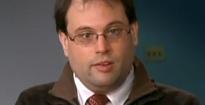Marc Ambinder Quits Blogging
 Marc Ambinder writes:
Marc Ambinder writes:
This is my final blog post for The Atlantic. Five years ago, as a way to boost the competitive metabolism of The Hotline, Chuck Todd hired me away from ABC News to create "Hotline On Call." I was to be the first political reporter working for a mainstream news organization whose output would be exclusively online. "On Call" made its debut in early September, the same week that Chris Cillizza began "The Fix." Back then, reporters didn't blog. Newspapers and magazines hired curators to update their websites, and reporters would occasionally post online, but there was a strict separation based on platform. You were considered legitimate only if your byline appeared in print. You were considered a blogger if it didn't. And you didn't want to be a blogger, because bloggers back then were second-class citizens of the country of journalism. Bloggers were partisan activists, yellers, provocateurs and upstarts.
The great cultural meshing of print and web journalism was a few years in the future. I know this because I toured several of the great American newsrooms and knew how many of their residents disdained the web and hated having to spend time writing for it. At the time, mainstream news entities were struggling to avoid struggling with basic questions, like what journalism really is, how to incorporate voice into prose with as little bias as possible, the posture of what reporting for a postmodern audience should be. These days, organizations still struggle with these questions, but they are, at long last, engaging with them, with varying degrees of success. I'd like to think that the Atlantic Media Company has been rather adroit, thanks to the leadership of people from David Bradley, our chairman, to James Bennet, the editor of the Atlantic, who devoted half of his time early on to developing a robust online presence, to Justin Smith, our then publisher and now president, who figured out how to make money from it, to Bob Cohn, a true visionary.My experience has not been unique, but it has spanned the life of this newly evolved species of reporter. I've had some time to think about what effect doing this day and night has had on the practice of journalism, on the quality of news-gathering and dissemination, and on the people who do it. I've written quite often on the first two subjects and participated in many discussions about them. All I will say here is that the mere fact that online reporters feel they must participate in endless discussions about these subjects is something new, a consequence of the medium, and is one reason why it can be so exhausting to do primarily web journalism. The feedback loop is relentless, punishing and is predicated on the assumption that the reporter's motivation is wrong. Unfortunately, the standard for defining oneself as a web journalist depends upon establishing a certain credibility with a particular audience of critics. Responding to complaints about content and structure and bias is part of the way one establishes that credibility.Really good print journalism is ego-free. By that I do not mean that the writer has no skin in the game, or that the writer lacks a perspective, or even that the writer does not write from a perspective. What I mean is that the writer is able to let the story and the reporting process, to the highest possible extent, unfold without a reporter's insecurities or parochial concerns intervening. Blogging is an ego-intensive process. Even in straight news stories, the format always requires you to put yourself into narrative. You are expected to not only have a point of view and reveal it, but be confident that it is the correct point of view. There is nothing wrong with this. As much as a writer can fabricate a detachment, or a "view from nowhere," as Jay Rosen has put it, the writer can also also fabricate a view from somewhere. You can't really be a reporter without it. I don't care whether people know how I feel about particular political issues; it's no secret where I stand on gay marriage, or on the science of climate change, and I wouldn't have it any other way. What I hope I will find refreshing about the change of formats is that I will no longer be compelled to turn every piece of prose into a personal, conclusive argument, to try and fit it into a coherent framework that belongs to a web-based personality called "Marc Ambinder" that people read because it's "Marc Ambinder," rather than because it's good or interesting.

